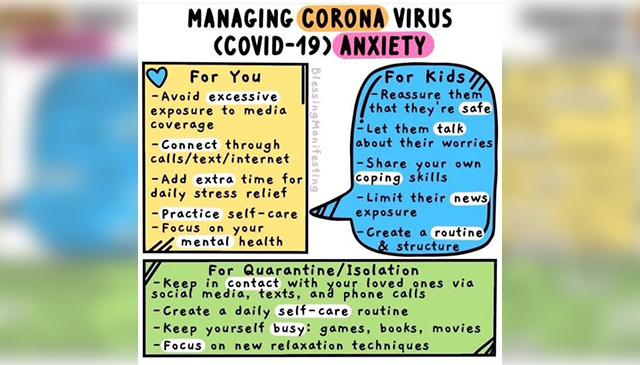
The COVID-19 pandemic has been a challenging time for all of us. We’ve been asked to step outside our comfort zones more than once, and we will most likely be asked to do so again before this event comes to an end. We want you to know that you are not alone and that if you find yourself feeling stressed about the situation, there are recourses available that can help support your mental, physical and spiritual needs.
Here’s how you can access many of those tools:
Stress Management
Click here for a comprehensive list of stress management resources provided by our Employee Health, Employee Assistance Program (EAP) and Well-Being teams.
Cigna also has the following tools to help you manage anxiety during the COVID-19 pandemic:
Managing anxiety
Coping with the fear of coronavirus
Self-care strategies
Relaxation techniques
Breathing: practicing deep breathing can help your body to feel more relaxed and refreshed in stressful moments. Check this article for a step-by-step deep breathing exercise.
Visualization: this technique helps expand our ability to rest and relax by focusing our minds on more calming and serene images. For a 15-minute guided imagery, please check this video.
Meditation: Meditation has great benefits for stress management and can be practiced in many ways. Check the steps for a 5-minute meditation to get started.
Eating healthy
- Regulate blood sugar with protein and fiber at meals and snacks. Regulating blood sugar with give your body the nutrients when stress may arise and strengthen your immune system.
- Consume fruits and vegetables at every meal. Your body needs a variety of vitamins and minerals to support your overall health. When the weather starts to change and people around you are starting to get sick, it is important to boost your immune system with vitamins and minerals like vitamin c, zinc, vitamin E, and vitamin A. Try to fill your plate with a variety of colors of fruits and vegetables along with protein, carbohydrates, and fat.
- Add garlic and ginger into your food. They do not fight the flu or coronavirus, but they do boost your immune system and may help lower blood pressure and slow down hardening of the arteries. Ginger is another food item that you may turn to after getting sick. Ginger decreases inflammation, which can help reduce sore throats and other inflammatory illnesses.
- Here are more tips on how to keep your immune system healthy.
Tired of cooking? You can access Mom’s Meals® through the Healthy Rewards program. Mom’s Meals® provides nutritionally balanced, refrigerated and ready-to-eat meals direct to your home, the home of an aging parent or any address nationwide. Place your order at 877-347-3438 or online at momsmeals.com/Cigna.
Get moving
Twenty minutes of daily exercise has been proven to boost the immune system. Movement produces with blood cells that kill bacteria and viruses.
Here are some exercises that you can perform at home.
Texas Children’s Employee Health and Wellness Strengthen and Tone instructor, Anna, is offering live classes on her personal Instagram account @Annahaulina on Mondays and Wednesdays at 6 p.m. Our Barre instructor, Alissa, will be offering class on Wednesdays from 11:30 a.m. to 12:15 p.m. Please email her at Alissa.ann@hotmail.com with Barre Class in the subject line and she will send you a Zoom link to participate.
- Define is offering free workouts from Bounce, Barre, Yoga, Beat (Dance Cardio), Mind and Prenatal.
- Camp Gladiator has just announced their Hustle from Home series of workouts, where anyone can have access to digital workouts, Facebook live workouts and at-home printable workouts.
- Peloton is offering a free 90-day trial for their workout library of strength, yoga, meditation, boot camp, cycling, and running classes.
- YouTube can always be accessed for a variety of excellent at-home workouts.
Stay calm and informed
Make sure that you are getting your information from a creditable source. Stay up to date with Texas Children’s COVID-19 communications. Click here to view the Connect COVID-19 page and here to visit our external COVID-19 Resources webpage.
Get plenty of sleep
More sleep does not prevent you from getting sick, however not getting enough could adversely affect your immune system. Without sufficient sleep, your body makes fewer cytokines, a type of protein that targets infection and inflammation, effectively creating an immune response. Experts recommend getting 7-9 hours of sleep a night.

